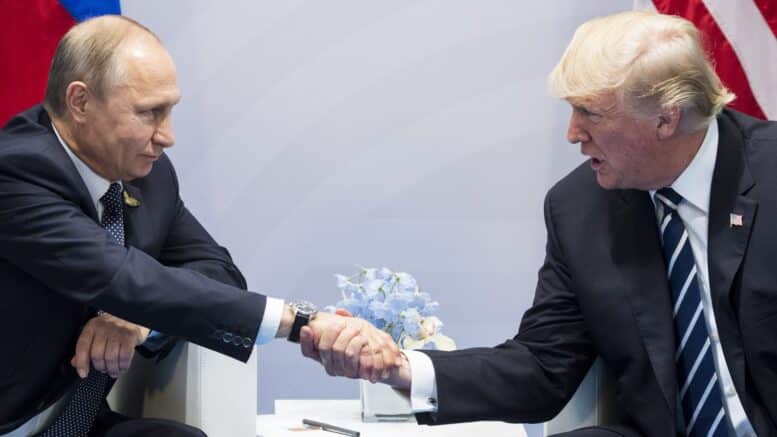The US Congress has recently passed sweeping new sanctions on Russia. Today, they were signed into law by President Trump. Both the sanctions and Russia’s reaction have been dramatic. However, in the end, both may have subdued consequences.
How Do The New US Sanctions Differ from the Old?
While past sanctions have targeted specific individuals and companies, the new sanctions make broad moves against whole sectors of Russia’s economy – including arms exports, energy exports, finance, banking, and rail construction, among others. It also puts sanctions under congressional control, rather than executive order. This means it will be much harder to rescind – essentially one of the main problems US-Russia relations had under the Jackson-Vanik amendment that took years to work out.
How Has Russia Responded?
Russia moved to answer the previous round of US actions against it (undertaken under President Obama) as the bill advanced through the US legislature. In theory, this reaction was in line with Russia’s usual foreign policy constructs – demands for parity and tit-for-tat. Russia will take two US properties in answer to the two taken by the US. Russia has also demanded that the US reduce diplomatic staff in Russia to parity with Russian diplomatic staff in the US. This is “in theory” in line with parity. However, the US expelled 35 Russian diplomats, bringing Russia’s number to 455. The US, meanwhile, may have as many as 1500 staff on the ground in Russia.
There is some confusion as to what the new order means. President Putin has stated that 755 diplomats and support staff working for the US will be affected and that his order must be complied with by September 1. Some from the US side, however, have argued that the order will not affect, for instance, locally employed Russians working for the embassy, as many are not connected with “diplomacy” and that this would mean that the drawdown will be, in fact, be minimal if not unneeded.
The US has reportedly already vacated the two properties in question but has not begun drawing down embassy staff nor has it announced that it will. It is likely that diplomats are currently discussing and clarifying the order.
What’s Next?
President Putin has stated that he has not considered further responses and is “for now” against considering them. However, there is currently a lot of noise on Russian television and in the Russian press on how Russia should respond to the vastly increased US sanctions currently making their way into law.
Russia, with far less presence within the world economy and over the global banking market, has fewer options to consider than does the US. President Putin did mention some sensitive areas that Russia could move against – for example, to restrict bilateral efforts concerning non-proliferation of weapons of mass destruction, fighting terrorism, or even space exploration projects. He said these would not be moved on, but did mention them as potential targets. Other commentators have floated the following:
- Answer any delay in providing Russians with visas with equivalent mandatory waits for Americans applying for Russian visas.
- Consider any inability of the American embassy to carry out normal diplomacy (due to staff cuts) as “sabotage” by the Americans, to be answered by diplomatic retaliation by the Russians.
- Cut the US off from space (astronauts and many satellites are currently carried by Russian rockets from a Russian space port)
- Cut off fertilizer supplies to the US (Russia controls a significant amount of the world’s potash and produces a considerable chunk of the world’s fertilizer).
- Withdraw investments in US bonds (while not as significant as Chinese investments into the same, they are still substantial).
- Tap Russian tax authorities to track the money of US elites and publish a report.
- Subject US businesses in Russia to vastly increased inspections – particularly in the food service industry.
- Ban the dollar from Russia.
So What Does All This Mean?
Again, President Putin has stated that he is against considering further sanctions. But he did condition that statement with the qualifier “for now.” It is also likely that Russia will wait to see how all the moving pieces begin to work before deciding on a next move.
There are several moving pieces to consider. Although the sanctions are now signed into law, there is some question as to how and if they will be implemented and enforced. US businesses have expressed concern that they will be negatively impacted. Germany’s Foreign Minister has told the EU Council that the new sanctions are “illegal.” She has said that while she “doesn’t want a trade war,” she does think that the EU should consider responses against the US for its actions. The EU is concerned that it was not consulted on the new round of sanctions (they were for previous rounds), that EU businesses will be affected, and that EU energy security may be compromised.
Thus, the US will face both internal and external challenges in implementing the new law in a way that truly balances America’s interests and those of its allies.
President Trump, in fact, upon signing the new law, which was passed with veto-proof support from both Congress and the Senate, issued a statement saying that he believes many provisions of the new law are “unconstitutional.” Trump, thus, is likely to clash with the legislature, perhaps even in court, if they attempt to implement and enforce the new sanctions outside of his authority.
Russia’s potential responses are also limited. Some of those ideas floated, such as increased inspections of US businesses, would require significant maintained expense from Russia’s related government institutions to sustain the pressure. Significant moves against businesses would likely negatively affect Russia’s business climate and the foreign investment that Russia needs and is still receiving despite currently enacted sanctions.
Some, such as moves against individual visas and ending space cooperation, move against areas what have been considered sacred in US-Russia diplomacy for years.
Thus, until effects can be seen from the latest US actions, it is most likely that Russia will simply wait. The most important thing to remember, however, is that Russian foreign policy is openly built on the concepts of tit-for-tat and parity. Thus, if US moves do have effects, Russia can be expected to move again.
Past moves have been to protect Russian industry from foreign competition by banning imports of specific products and moves against the governments of its adversaries specifically. While nothing should be ruled impossible, it is most likely that Russia will seek to strengthen or broaden agricultural sanctions or move to sanction another specific industry or industries to further promote domestic production, a stated policy goal of the Kremlin. Any diplomatic or government moves can also be expected to be answered in a way that will maintain tit-for-tat.



